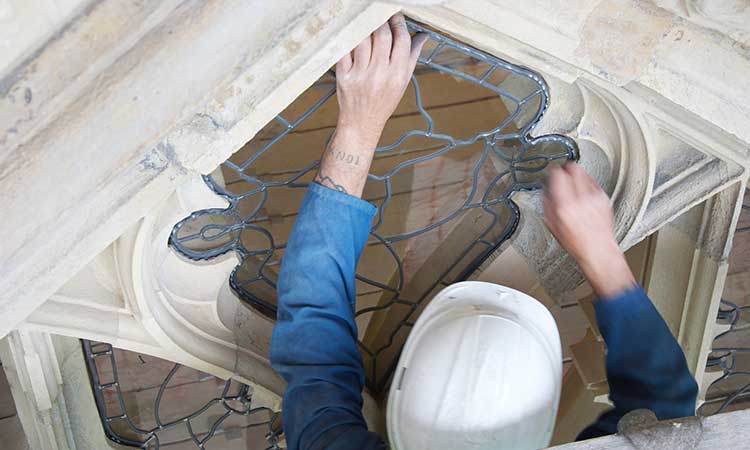Gazing through glazing can be inspirational – but could you write a windows poem, asks Carole Bromley?

The painstaking and delicate work of putting back the restored panels in the Great East Window of York Minster has begun. To mark the occasion I thought I would set readers the task of writing their own windows poem.
A good starting point would be to watch the glaziers at work or to take this once in a lifetime opportunity to view the glass close up.
You might want to write about the glass itself, the restoration process (you can take a tour to the glaziers’ workshop) or the stories behind the panels.
I wrote this poem in 2011 when one panel was on display at floor level and I saw that a cheeky apprentice had added his own signature to the glass. In the poem I’m imagining what was going through his mind.
Tom Makes His Mark
Thomas Clarke, Plumber and Glazier
July 4th – 1794, aged 15I did it for a dare and to win a girl. She said
I never would but I proved her wrong,
chose the horse’s arse, bottom left
on the last panel, the one about the apocalypse.I’ve a handsome hand but big and this
was the widest expanse of clear glass to write on.
I was proud of my curled initial, though my hand
shook a little when I heard the master coming
and the writing slopes downhill
to the right like on the board at school.Anyway, after all those back-breaking months
of grozing, of staining my fingers
with lunar caustic and Cousin’s rose,
of straining my eyes repainting chain mail,
an ape’s tooth, the turned-down mouth
of a knight, the way I saw it, I’d a right.And who was to know? Once the panel
was hoisted into place and the scaffolding
removed no-one would see the details
till dirt and damp and loosening glue
had undone our handiwork and that
wouldn’t be for a century or two.I like to think of an apprentice
all those years hence, reading my words.
I wish I could tell him about the night,
oh the night, I spent with the girl.Carole Bromley (first published on the Keats/Shelley Prize website)
Like most people this summer I have had my windows flung open and mostly been outside whenever I could, but poems about looking out through a window can be very effective.
The limited view narrows the focus to precise detail and can enable you to capture the scene and atmosphere as well as to pan out from that into your thoughts.
Try it. Sit by a window and start by jotting down what you can see, who or what is passing by, what is out there just beyond the frame or hidden from view? Imagine opening the window and reaching out. What might you touch?
Here is Seamus Heaney in St Kevin and the Blackbird doing just that.
Or you could think of a window you looked out of at some time in the past. The one in the hospital ward after giving birth, the one you gazed out of while sitting with someone who was dying, the one in that bedsit the first time you made love or the first time a lover walked out on you.
Think of lots of different windows in different buildings. Skylights are good. Here’s Heaney again writing about that gap between house and sky.
There are two ways of looking through a window. Try being on the outside looking in. Here is Baudelaire doing just that.
You can use windows as a metaphor, of course. Explore the place where in meets out, the fragile barrier between reality and the imagination or between responsibility and freedom or between safety and danger.
Here is Philip Larkin in High Windows moving from the words that express his longing to be young again to an image of high windows. It’s the image that gives the poem its power:
Rather than words comes the thought of high windows:
The sun-comprehending glass,
And beyond it, the deep blue air, that shows
Nothing, and is nowhere, and is endless.
I’ll leave you with another poem about being inside looking out. Just in case it goes on raining and you have no choice!
Click here to email your poems to YorkMix by Monday, August 25 and I will publish the most interesting responses here by the end of the month.
 Carole Bromley is married with four children and lives in York. Twice a winner in The Poetry Business Book and Pamphlet Competition, she has two pamphlets with Smith/Doorstop (Unscheduled Holt, 2005, and Skylight, 2009) and a collection A Guided Tour of the Ice House. She has won a number of first prizes, including The Bridport and Yorkshire Open, and her poems have appeared in a range of magazines and anthologies. Carole is a graduate of the MPhil in Writing at Glamorgan University and teaches creative writing for York University’s Centre for Lifelong Learning.
Carole Bromley is married with four children and lives in York. Twice a winner in The Poetry Business Book and Pamphlet Competition, she has two pamphlets with Smith/Doorstop (Unscheduled Holt, 2005, and Skylight, 2009) and a collection A Guided Tour of the Ice House. She has won a number of first prizes, including The Bridport and Yorkshire Open, and her poems have appeared in a range of magazines and anthologies. Carole is a graduate of the MPhil in Writing at Glamorgan University and teaches creative writing for York University’s Centre for Lifelong Learning.